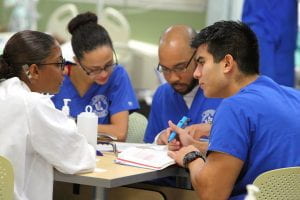“I heard…,” “my friends told me…,” “I asked my friend…,”
The Associate Deans and I hear these statements so many times. While it’s frustrating for us, it’s also instinctive behavior, getting information from our friends and classmates. Just last week, I heard some information about my Alma mater and the first thing i did was text three of my former classmates and asked if they thought the news applied to us. I didn’t go to the actual source, the university, until several days later.
Gossip actually has roots related to nursing. In the 17th century, a gossip was the equivalent of what we often now call a godmother. A gossip was the person selected by a woman to attend the birth of her child as a witness (in addition to the midwife) and then to spread the news of the birth (Chinn, 1990). Because it was always women to attended the birth as the gossip, the word, gossip, became associated with women. Nursing was, a traditionally female profession. Gossiping has evolved to take on a negative connotation, associated with spreading negative rumors and news.
It is not unusual in nursing for gossip to be used as a form of communication, and has value as a way to handle the stress and anxiety of a high-pressure profession (Mark, Waddington, & Fletcher, 2005; Scott, 2003). It follows that gossip will be used as a way to share information among nursing students, who are also facing the stress and anxiety of a high pressure program. I’m not here to tell you to stop gossiping because, honestly, gossip may be a good tool in creating and sustaining a support group during nursing school and we all know that a support group is important.
However, I am here to caution you to take information shared through gossip for what it is – a way to establish relationships by communicating shared experiences and news with friends and classmates. Understand that what you hear from friends and classmates may not be fact, it might be a rumor or a misconception with meaning that has been slightly altered as it is passed from person to person.
When it comes to the nursing program, both ASN and RN-BSN, verify the information you hear from friends and classmates with your professors, your Associate Dean, or me. We all have office hours and we all respond to emails. We want to make sure that you’re getting the right information and have the facts.
Use gossip wisely to help build your support system. You can build a community of support by using gossip to inform and share, to build up your classmates and not to compete. Most important, share information that is factual and know/name the source from which it came. Go forth and gossip in a purposeful way.
References
Scott, H. (2003). Nurses tend to cope with work pressures through gossiping. British Journal of Nursing, 12(8), 456. doi:1012968/bjon.2003.12.8.11267
Chinn ,PL. (1990). GOSSIP: a transformative art for nursing education. Journal of Nursing Education, 29(7), 318–321.
Mark, A., Waddington, K., & Fletcher, C. (2005). Gossip and emotion in nursing and health care organizations. Journal of Health Organization and Management, 19(4/5), 378-394. doi:10.1108/14777260510615404

